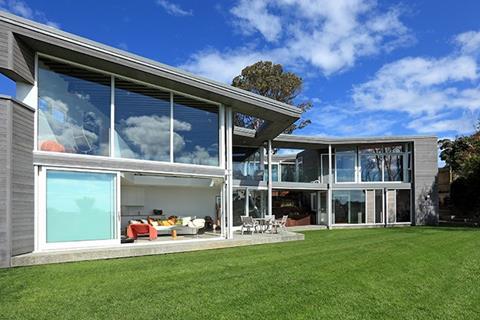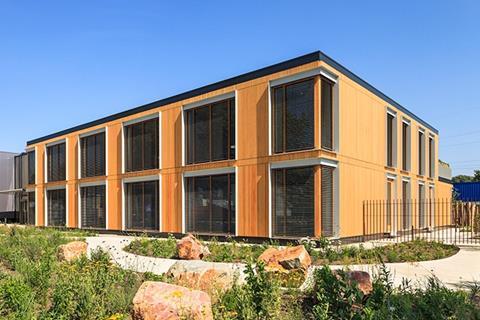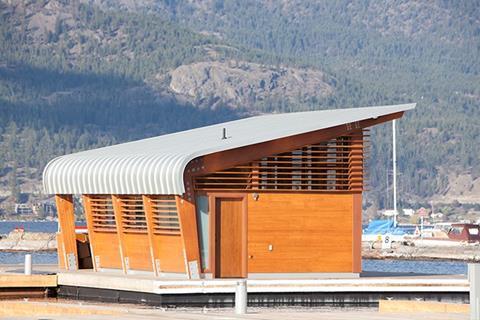The acetylation process modifies softwood to make it more durable and dimensionally stable. This CPD, sponsored by Accsys, outlines the product’s main benefits and applications

How to take this module
UBM’s CPD distance-learning programme is open to anyone seeking to develop their knowledge and skills. Each module also offers members of professional institutions an opportunity to earn between 30 and 90 minutes of credits towards their annual CPD requirement.
This article is accredited by the CPD Certification Service. To earn CPD credits, read the article and then click the link below to complete your details and answer the questions. You will receive your results instantly, and if all the questions are correctly answered, you will be able to download your CPD certificate straight away.
CPD CREDITS: 60 MINUTES
DEADLINE: 2 DECEMBER 2016


INTRODUCTION
Acetylated wood is a modified, sustainably grown softwood from New Zealand. The acetylation process increases the amount of acetyl molecules and reduces the amount of hydroxyls in the wood, which improves durability, dimensional stability, insect resistance and the service life of coatings. Acetylated wood is particularly suited to exterior applications where high performance is required such as windows, doors, cladding, decking, outdoor furniture and structural projects such as bridges and canal linings.
Acetylation has been studied by scientists for more than 90 years. The earliest known scientific paper about the acetylation of wood dates back to 1928 and the first patent was granted in 1930, but attempts to commercialise acetylated wood were unsuccessful. However, there is now an operating plant in the Netherlands, which creates acetylated wood under the name of Accoya. The plant has been open since 2007 and sells to more than 50 countries worldwide.
THE ACETYLATION PROCESS
Wood contains an abundance of chemical groups called free hydroxyls. Free hydroxyl groups adsorb and release water according to changes in the climatic conditions to which the wood is exposed; this is the main reason why wood swells and shrinks. It is also believed that the digestion of wood by enzymes initiates at the free hydroxyl sites, which is one of the principal reasons why wood is prone to decay.
Acetylation effectively changes the free hydroxyls within the wood into stable acetyl groups. This is achieved by the wood reacting with acetic anhydride, which comes from acetic acid (known as vinegar in its diluted form). When the free hydroxyl group is transformed to an acetyl group, the ability to absorb water is greatly reduced, rendering the wood more dimensionally stable and, because it is no longer digestible, extremely durable.
Acetyl groups, which are simply comprised of oxygen, hydrogen and carbon, are already naturally present in all wood, as well as in humans and other mammals. This means that the manufacturing process adds nothing to the wood that does not already naturally occur within it; therefore the end product does not add toxins to the environment. The only bi-products from the manufacture of acetic anhydride are a small amount of fertiliser and trace amounts of acetic acid, which are both easily biodegraded.
The effect of altering the wood’s chemical structure, as opposed to merely altering its chemical content, essentially creates a new product. By contrast, virtually all other treatments insert chemicals (such as oils, ammonia or metal compounds) into the cell walls of the wood. The acetylation process modifies the wood through to the core, achieving class 1 durability throughout the cross-section of the wood. The process is irreversible and there is no risk of the treatment leaching.
The wood is easy to machine and process manually and can be fixed in the same way as other common softwood species.

BENEFITS
Acetylated wood offers a number of performance benefits. These include:
Durability
Rot causes wood to degrade, particularly when it is used outdoors and exposed to moisture, limiting its service life. Acetylated wood is a more durable alternative.
The durability of acetylated wood is rated as class 1 under BS EN 113. This is the highest rating, comparable to the best-performing hardwoods. While some wood species are naturally durable, this is a variable and inconsistent property, which can cause subsequent problems. For example, Teak can range from class 1 to 3 and Meranti can range from class 2 to 4, whereas acetylated wood is consistently class 1. Durable woods also tend to be slower growing species, whereas acetylated wood is made using fast-growing, sustainably forested Radiata Pine, so old-growth forests are not threatened or depleted.Acetylated wood is guaranteed to last 50 years above ground and 25 years in direct contact with soil or fresh water. It is virtually rot-proof.The longer lifespan means lower material consumption over the same period, as well as offering carbon sequestration advantages. The acetylation process does not compromise the wood’s strength, but rather increases hardness. Because of this, acetylated wood has a high strength-to-weight ratio, making it suitable for certain structural applications.
Dimensional stability
Wood swells in damp or wet conditions and shrinks in dry, hot conditions, which can have unwelcome implications. Windows and doors may jam or let in drafts; wood may warp or split, inviting further degradation by insects and more frequent maintenance cycles; and structures may become unstable. Acetylated wood offers dimensional stability in both radial and tangential directions (thickness and width), which means that it has minimal swelling and shrinkage and can be used in applications with varying moisture conditions – even immersion in fresh water.
Dimensional stability can be defined as the degree to which a material maintains its original dimensions when subjected to environmental changes. Independent analysis by the Timber Research and Development Association (TRADA) shows that acetylated wood has minimal cupping, shrinking and swelling after harsh testing and can offer a stable wood product with consistent performance. The tests indicate that acetylated wood’s dimensional stability matches or exceeds hardwood species including Teak, Sapele, Iroko and Western Red Cedar.The dimensional stability of acetylated wood ensures swelling and shrinkage is reduced to 1.5% in either direction. Window joints do not crack and split, tolerances remain tight, and twist is dramatically reduced. There is less stress exerted on coatings which ensures that the coating life is extended, lengthening the maintenance cycle and reducing maintenance costs.

TESTING OF ACETYLATED WOOD
Product testing and third-party validation has been undertaken on many different aspects of performance. Scion, formerly known as the New Zealand Forest Research Institute, undertakes research, science and technology development in forestry, wood products, biomaterials and bio-energy. Scion tested the durability of acetylated wood against other naturally durable and preservative-treated timbers. The test site runs exposed timbers in accelerated decay chambers and in exterior ground contact tests.The tests have run continuously for eight years and show acetylated wood performing better than Teak, Merbau, Cypress and Cedar, as well as timbers treated with the preservative CCA in accordance with the hazard classes H3.2 (above ground, uncoated horizontal) and H4 (in ground contact).In February 1998, L-joints were installed at the BRE Garston field exposure site in Watford, UK, facing the prevailing south-westerly weather on an elevated testing. The test remains in progress with inspections at regular intervals. The BRE reported: “In simulated accelerated joinery field trials that represent a worst case scenario joinery product by enabling moisture ingress into the joint pine, sapwood L-joints acetylated to a slightly lower modification level than acetylated wood, after 15 years’ exposure in the UK are performing very well. The trial indicates that a permeable timber species that is acetylated through the cross section to a durability class 1 level (eg, Accoya), would have a grading lower than the reference preservative TnBTO – and thus acetylated wood would exceed the biological reference value and would be deemed to provide sufficient protection for long-life window joinery.”

APPLICATIONS FOR ACETYLATED WOOD
There are many applications for acetylated wood, ranging from cladding to heavy-traffic road bridges.
Cladding
Acetylated wood can be specified in wide boards without warping or gaps, and a wide range of sizes without stability issues. Exterior exposure tests by TRADA on uncoated 195mm-wide, 15mm-thick cladding boards over a two-year period concluded that no cupping could be detected and that the boards would remain free from detectable distortion over a 50-year life.
Acetylated wood will take light coloured stains without darkening the underlying wood, as well as dark stains and paint. Its light weight offers ease of installation and time savings. It also has the flexibility to be used for more innovative shapes.
Windows and doors
Acetylated wood provides long-life external windows and doors. It can be manufactured as parts a long time before assembly and the tight tolerances of the factory process aid energy efficiency and pollution control. Solid Accoya offers good thermal conductivity, with an average lambda value of 0.12W/mK under the BS EN 12667 test method, it avoids condensation and will not bind in humidity.
Shading
Highly vulnerable and visible applications such as shading, louvres and shutters benefit from the minimised warping and extended coating lives of acetylated wood. A wide range of colours are available and there can be large spans between fixings.
Decking and marine applications
In specifying decking, marina jetties, pontoons and other applications where the wood is frequently wet and close to, or in contact, with the ground, strength and all-weather performance are important. A dimensionally stable material that will stay flat and has very minimal bow, cup, warp and split and will not be affected by fungi, rot or insects is desirable.
Acetylated wood offers a traditional and natural look with ease of maintenance, it retains its natural strength, and due to the acetylation process it is less sensitive to surface heat than with tropical hardwoods or plastics. Acetylated wood also has better traction than many alternatives, important for floor surfaces that are likely to become wet or frozen.
Structural applications
Acetylated wood can be used for structural projects because it has a very high strength-to-weight ratio, installation is quite easy and fast, and it requires little maintenance. Dimensional stability means that variance in size is both low and predictable.

How to take this module
UBM’s CPD distance-learning programme is open to anyone seeking to develop their knowledge and skills. Each module also offers members of professional institutions an opportunity to earn between 30 and 90 minutes of credits towards their annual CPD requirement.
This article is accredited by the CPD Certification Service. To earn CPD credits, read the article and then click the link below to complete your details and answer the questions. You will receive your results instantly, and if all the questions are correctly answered, you will be able to download your CPD certificate straight away.
CPD CREDITS: 60 MINUTES
DEADLINE: 2 DECEMBER 2016
Privacy policy
Information you supply to UBM Information Ltd may be used for publication and also to provide you with information about our products or services in the form of direct marketing by email, telephone, fax or post. Information may also be made available to third parties. UBM Information Ltd may send updates about �ڶ����� CPD and other relevant UBM products and services. By providing your email address you consent to being contacted by email by UBM Information Ltd or other third parties. If at any time you no longer wish to receive anything from UBM Information Ltd or to have your data made available to third parties, contact the Data Protection Coordinator, UBM Information Ltd, FREEPOST LON 15637, Tonbridge, TN9 1BR, Freephone 0800 279 0357 or email ubmidpa@ubm.com. View our full privacy policy at




















No comments yet